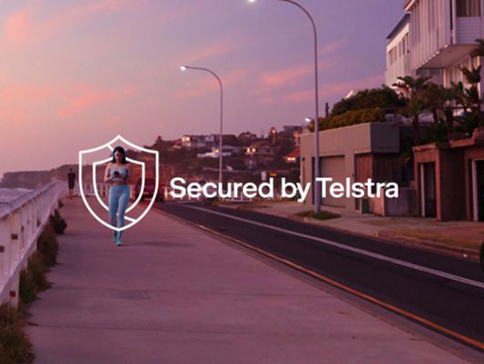Cyber Security and Safety
Committed to your online safety

It's National Cyber Security Awareness Month
October is National Cyber Security Awareness Month and we're focusing on two-step verification, updating your software, password security and phishing scam awareness.
Secure your account
The two-step verification process is a stronger level of security designed to help keep your Telstra account safe from unauthorised access.
Do your security updates
Software updates help fix security gaps, making it harder for unwelcome visitors to access devices. Update when prompted.
Create stronger passwords
This is your first line of defence against hackers. Add a password manager to eliminate the need for multiple passwords.
Report a scam
Setting up a scam filter in the My Telstra app helps block malicious texts before they reach your phone. If you receive a suspicious email, call or text, please report it.
We block millions of threats, every day
We monitor our network 24/7, so blocking millions of threats like scams, malicious calls, emails and websites is all in a day’s work. It's a great idea for you to stay aware of active scams too.
Extra security options
DEVICE SECURITY ESSENTIALS
Protection at home or on the go
Rest easy knowing you have more protection from online threats with Device Security Essentials.
- Wi-Fi Scan
- Safe browsing
- Device check
Staying safe from harmful content
Online safety for yourself and your family
Learn how you can help protect yourself, your family and others from harmful or inappropriate online content. Our resources will help you set up parental controls and content filters, block unwanted contact and build safe online habits.
Reporting harmful content to the eSafety Commissioner
The eSafety Commissioner is Australia's independent regulator for online safety. Their role is to help safeguard you from online harm. If you've experienced cyber bullying, cyber abuse, seen non-consensual images or material that promotes, incites, instructs or depicts abhorrent conduct, please report it to the eSafety Commissioner.
Articles about cyber security and safety
Cyber myths busted
How cyber savvy are you? Test and improve your cyber security knowledge to help you stay safer online.
Helping keep data private
Easy ways to help protect your personal info online and minimise your exposure to misuse.
Password tips
Discover simple ways to manage your passwords and keep your accounts safe.
Helping you shop securely
You'll love the convenience of online shopping—and the peace of mind about how secure it is.
FAQs
Find the answers to common questions about Cyber Security and Safety
Some of the ways we use your personal information
- To help us manage the products and services we provide to you, for customer enquiries and complaints, and to maintain and update our records. We need to verify your identity to detect, prevent and address fraud. We also use your information for charging and billing and to identify breaches of our terms and conditions of service.
- For network, security and fraud protection, including blocking malicious content, as well as monitoring for known domains which can lead to downloading malicious software onto devices. Where Telstra’s DNS services are used to connect to known malicious domains, we may use your personal information to determine whether you might be impacted, and take action to block the activity and/or notify you so that you can protect yourself. We may also use your information to prevent identity theft, unauthorised transactions, or other fraudulent activities, on or off our networks (e.g., fraudulent bank transactions).
- To communicate with you via phone, email, SMS, social media, search engines and web pages you visit.
- Direct marketing to tell you about products, services and special offers of Telstra and its related entities. We may use your information to market and promote products, services and special offers, including Telstra loyalty programs.
- We may also contact you about products, services and offers from our trusted partners. In some cases, this marketing activity can continue for up to 13 months after you have stopped using our products or services, unless you opt out. Please be aware that if you unsubscribe from a mailing list, we will continue to send you important messages that are not marketing communications, such as safety or administrative messages.
- You can stop Telstra using your information unsubscribing from our marketing communications. Log into My Telstra or call us on 1800 039 059.
- We are required and permitted by law to use your personal information in certain circumstances.
Parental controls are a great idea. Check your device operating system, search engine, and gaming platforms to help manage what your kids can see/do online. There are also ways to monitor activity and place restrictions on specific devices. Telstra Device Security is a great product to help keep individual devices safe. You can also choose a filter from the industry-endorsed Family Friendly Filter program.
Lodge an illegal or offensive digital content complaint via the Office of the eSafety Commissioner.
Safety tipsheets for all of us
Parenting tipsheets for your family
Here are two of the most common cyber threats:
Identity theft
When an unauthorised person accesses your personal information, they can create fake IDs. They can also take loans out or make expensive purchases online in your name.
Identity theft is usually seen as a hacker’s activity, but it's often carried out by someone you know. For example, it could be a former partner making purchases in your name because they have access to one of your accounts or your personal information. Be cautious when sharing details and when you part ways with someone and make sure they don’t still have access to any of your accounts.
Hacking and data breaches
It’s not uncommon for apps, services, websites, and devices to have security flaws. Criminals can exploit these flaws to access private data and sell it over the dark web or use it to steal money.
You've heard about data breaches where millions of private records have been compromised - affecting the security of people who have had their information stolen. That’s why companies work hard to eliminate as many security flaws and vulnerabilities as they can.
There isn’t much you can do to stop companies getting hacked, but there are a few actions to help reduce the risk of your data being leaked.
- Keep your devices and apps up to date. Security updates plug any vulnerabilities to make it harder for hackers.
- Enable two-step verification. Even if an unauthorised person gains access to your username and password, they'd still need to complete an extra identity verification step before they can get into your account. This significantly reduces their chances of access.
Learn more about cyber security and safety
Need help?
Message us in the My Telstra app
Got a cyber security concern? Ask us in the My Telstra app. It's quick and easy and we’ll get back to you as soon as we can.
Online help & support
Find answers to your frequently asked questions.




